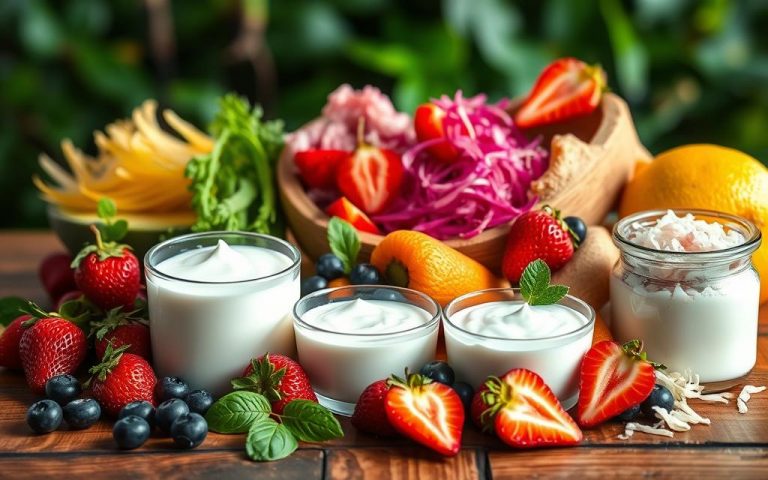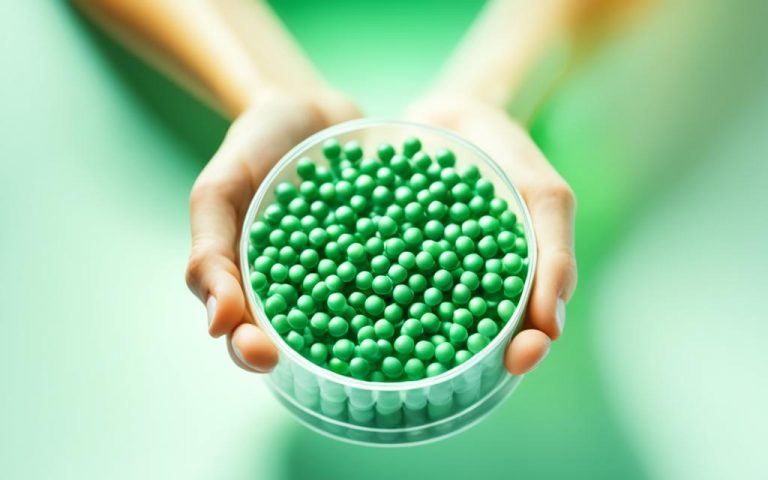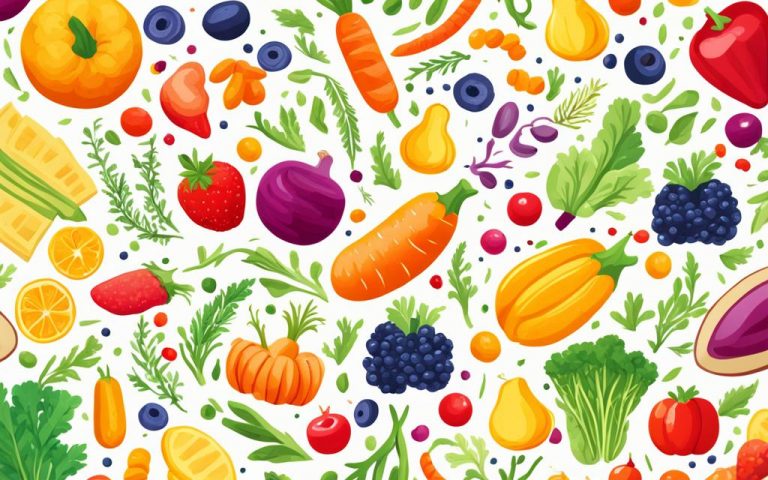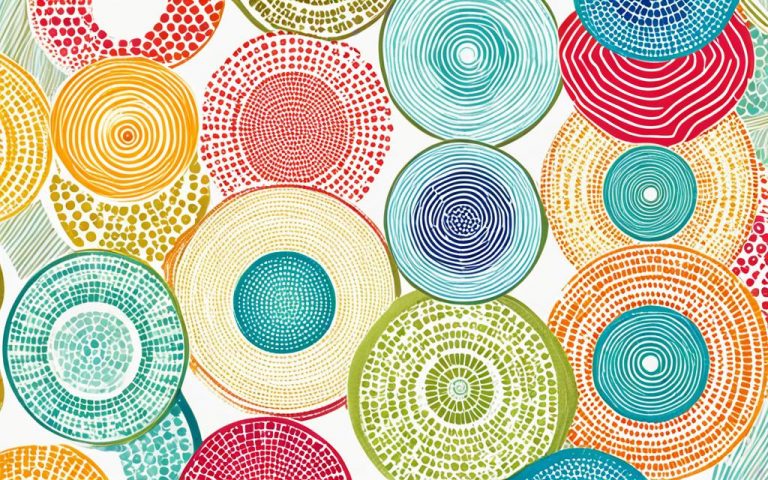Prebiotics Overview: Discover the Benefits of Prebiotics
Prebiotics are changing our view on gut health. These fibers do not digest but feed the good bacteria in our guts. This process helps us stay healthy. Foods and supplements rich in prebiotic fiber are the key.
Compared to probiotic foods, prebiotics don’t add more bacteria. They make the existing good bacteria stronger. This approach keeps our gut microbiome diverse and healthy. It’s a big win for our gut health and overall well-being.
Key Takeaways
- Prebiotics are specialized dietary fibers that nourish beneficial gut bacteria.
- They promote a balanced and diverse gut microbiome, essential for optimal gut health.
- Prebiotics are found in various plant-based foods and supplements.
- Consuming prebiotic fiber-rich foods supports the growth of beneficial gut bacteria.
- Prebiotics offer numerous health benefits beyond just gut health.
What are Prebiotics?
Prebiotics are like fuel for the good bacteria in your gut. Unlike probiotics, they aren’t live. Instead, prebiotics are non-digestible fibers that feed the healthy bacteria in your stomach.
Definition and Understanding Prebiotics
In simple words, prebiotics are food for the good gut bacteria. They help these bacteria grow and work better, which is great for your health.
Types of Prebiotic Fiber
The main types of prebiotic fibers are:
- Inulin
- Fructooligosaccharides (FOS)
- Galactooligosaccharides (GOS)
- Resistant starch
These types of fiber are called prebiotics because they aren’t digested in the small intestine. Instead, they make their way to the large intestine where they help your body.
Sources of Prebiotics
You can find prebiotics in many plant foods, including:
- Vegetables like asparagus, onions, and garlic
- Fruits such as bananas and berries
- Whole grains like oats and barley
- Legumes including soybeans and lentils
Some foods have prebiotic fibers added to them, like cereals and yogurt.
| Prebiotic Fiber Type | Food Sources |
|---|---|
| Inulin | Chicory root, Jerusalem artichoke, onions, garlic, leeks, asparagus |
| Fructooligosaccharides (FOS) | Bananas, onions, garlic, chicory root, blue agave |
| Galactooligosaccharides (GOS) | Beans, lentils, chickpeas, soybeans, milk products |
| Resistant Starch | Whole grains, legumes, potatoes, green bananas, plantains |
Eating foods rich in prebiotics can help your gut be healthier. This, in turn, keeps you feeling well.
The Role of Prebiotics in Gut Health
Prebiotics are key for keeping your gut healthy. They feed and help good bacteria grow. This good bacteria is important for digestion and absorbing nutrients well.
Supporting Beneficial Gut Bacteria
Our gut is full of tiny beings like bacteria, fungi, and viruses. Many are helpful, aiding digestion and keeping us healthy. Prebiotics are their food, making them grow and work better.
Prebiotics ensure our gut has plenty of good bacteria. This reduces the bad ones. A balanced gut means being healthier.
Improving Digestion and Nutrient Absorption
When our gut bacteria eat prebiotics, they make helpful substances. These substances keep our gut healthy, help absorb nutrients better, and keep us regular.
Prebiotics also make it easier for our body to break down some foods. This means we get more nutrients from what we eat. It helps keep us healthy and strong.
Overall, prebiotics help our gut work well. They make us absorb more from our food. This is good for our health.
| Prebiotic Benefit | Description |
|---|---|
| Supports Gut Bacteria | Prebiotics selectively nourish beneficial gut bacteria, promoting a balanced microbiome. |
| Enhances Digestion | Prebiotics aid in the breakdown and digestion of complex carbohydrates and proteins. |
| Improves Nutrient Absorption | By-products of prebiotic fermentation facilitate nutrient absorption in the gut. |
Prebiotics and the Microbiome
The human gut is a diverse world full of tiny creatures. These creatures, called the gut microbiome, are essential for our health. Prebiotics, which are special fibers our body can’t digest, are like food for the good bacteria in our gut.
Maintaining a Healthy Gut Microbiome
Having a good mix of microorganisms in our gut is very important. It helps us digest food, absorb nutrients, and keeps our immune system strong. Prebiotics help the beneficial bacteria grow, creating a healthy balance in our gut.
According to the International Scientific Association for Probiotics and Prebiotics (ISAPP), “Prebiotics are substrates that are selectively utilized by host microorganisms conferring a health benefit.”
Eating foods high in prebiotics, like onions and whole grains, keeps our gut in check. This is key for good digestion and overall health.
Enhancing Immune Function
Our gut bacteria also help keep our immune system in shape. Prebiotics play a vital role by supporting the good bacteria. These good bacteria then make substances that help our immune system fight off bad bugs.
Studies show prebiotics may reduce harmful inflammation and help us fight diseases. So, by taking care of our gut bacteria, prebiotics can make us healthier.
| Prebiotic Source | Prebiotic Type | Benefits for Gut Microbiome |
|---|---|---|
| Chicory Root | Inulin | Promotes growth of bifidobacteria |
| Onions | Fructooligosaccharides (FOS) | Supports diversity and balance of gut bacteria |
| Whole Grains | Resistant Starch | Feeds beneficial bacteria, supports metabolic health |
Eating a variety of prebiotic-rich foods supports a healthy gut. This, in turn, keeps our digestion, immunity, and overall health strong.
Prebiotics Overview: Benefits Beyond Gut Health
Prebiotics are known for improving gut health. But, new research shows they can benefit more than our insides. They may help us feel better in many ways.
Potential Benefits for Heart Health
Studies are showing prebiotic fiber is good for the heart. It can lower bad cholesterol and make your heart healthier. Prebiotics also help keep blood pressure in check by making good substances in your gut.
Prebiotic Fiber and Weight Management
Prebiotics can help with weight by making you feel full. They trigger hormones that signal your brain when you’re satisfied. This may make it easier to eat less and manage your weight.
They also seem to change how the body uses energy. This might help burn fat better, backing weight loss efforts. But, this works best with a healthy diet and exercise.
| Prebiotic Fiber | Potential Benefits |
|---|---|
| Inulin |
|
| Oligofructose |
|
There’s still more to learn about how prebiotics help. But, the potential for heart and weight benefits looks real. It’s an exciting field for scientists.
Incorporating Prebiotics into Your Diet
Adding prebiotics to your daily meals can make a big difference in supporting gut health. It’s not hard. By choosing foods high in prebiotics, you can help the good bacteria in your gut. This leads to better health.
Prebiotic-Rich Foods to Include
Many foods we already eat are packed with prebiotics. Adding these to your diet is easy:
- Vegetables: Onions, garlic, leeks, asparagus, artichokes, and chicory root
- Fruits: Bananas, apples, and berries
- Grains: Whole wheat, oats, and barley
- Legumes: Chickpeas, lentils, and beans
- Probiotic foods: Yogurt, kefir, and fermented vegetables like sauerkraut
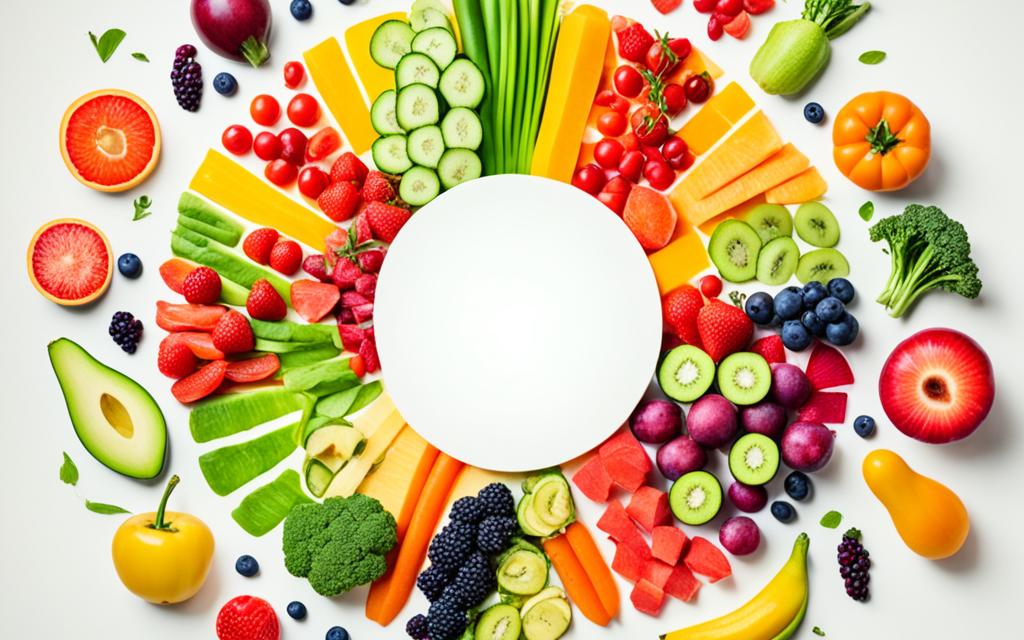
Tips for Increasing Prebiotic Intake
There are easy ways to eat more prebiotics. This includes:
- Have a breakfast rich in prebiotics, like oatmeal with berries and flaxseeds.
- Snack on vegetables with hummus or mixed nuts and dried fruit.
- Eat vegetables high in prebiotics, like garlic and onions, or salads with chicory leaves.
- Try new recipes with prebiotic foods, such as lentil stews or barley risotto.
- If you need extra, consider a prebiotic supplement.
| Food | Prebiotic Fiber Content |
|---|---|
| Onions | 3-10 grams per cup |
| Garlic | 1-2 grams per clove |
| Bananas | 0.5-1 gram per medium-sized banana |
| Whole Wheat Bread | 1-2 grams per slice |
By eating a variety of prebiotic-rich foods, you support your gut health. This also improves your overall well-being in many ways.
Combining Prebiotics and Probiotics
Prebiotics and probiotics work together to make your gut healthy. Prebiotics are like food for the good bacteria from probiotics. This helps the good bacteria grow strong in your gut.
Understanding the Synergistic Relationship
Prebiotics are special fibers that feed the good bacteria in your gut. They pass through your stomach without being digested. When they reach the colon, gut bacteria change them into short-chain fatty acids (SCFAs). SCFAs are great for your gut and keep you healthy.
Probiotics are living bacteria that are good for you when you eat enough of them. They help keep your gut’s bacteria balanced. They also help with digestion and keep your immune system working well.
Prebiotics and probiotics work well together. Prebiotics feed and help the probiotic bacteria in your gut. This makes sure the probiotics stay strong and do their job well.
Dr. Emeran Mayer says combining prebiotics and probiotics is great for your health. He’s an expert in stomach and brain health at UCLA.
Enhancing Gut Health Benefits
Together, prebiotics and probiotics do a lot for your gut. They offer many benefits like better digestion, a stronger immune system, and fewer stomach problems.
They can help prevent and manage health issues like IBS, IBD, and metabolic disorders. Adding them to your diet helps your gut stay healthy, which is good for your whole body.
Prebiotic Supplements: Do You Need Them?
Is your diet packed with prebiotic foods? If you eat lots of fruits, veggies, and whole grains, you’re getting a good amount of prebiotics. But, for some folks, taking prebiotic supplements might be a good idea. These supplements are packed with prebiotics, making it simple to get what you need every day.
When Supplements May Be Beneficial
Thinking about trying prebiotic supplements? They could be extra helpful in a few cases:
- If you have tummy troubles like IBS or IBD, these supplements might ease your symptoms and make your gut healthier.
- On a special diet or can’t eat many prebiotic foods? Supplements can fill in the gaps for you.
- Life factors like stress, getting older, or certain meds can mess with your gut. Prebiotic supplements might help fix things.
Choosing a High-Quality Prebiotic Supplement
Picking the right prebiotic supplement is key. Go for ones with top-notch prebiotic fibers like inulin, GOS, or FOS. Make sure the brand is reputable and does quality checks.
Talk to your doc, too – especially if you’re on meds or have health issues. They can help you choose the best supplement and check for any drug interactions.
| Prebiotic Fiber | Common Sources | Potential Benefits |
|---|---|---|
| Inulin | Chicory root, bananas, onions | Supports digestive health, promotes beneficial gut bacteria |
| Galacto-oligosaccharides (GOS) | Dairy products, legumes, human milk | Enhances mineral absorption, supports immune function |
| Fructo-oligosaccharides (FOS) | Fruits, vegetables, grains | Promotes healthy gut microbiome, improves bowel regularity |
Prebiotic supplements can help, but they’re not a total diet replacement. Add them to your prebiotic-rich meals if needed. Always check with your doctor before starting supplements to see if they’re right for you.
Potential Side Effects and Precautions
Prebiotics are great for your gut health, but be careful. There are some side effects to watch out for. When adding prebiotics to your diet, your body might feel a bit off at first. This is normal as your body gets used to the change.
Addressing Digestive Discomfort
Increasing prebiotic fiber can lead to bloating, gas, or mild cramps. These issues don’t last forever and go away as your body gets better at coping with the extra prebiotics.
The key to avoid discomfort is to go slow. Add more prebiotic-rich foods to your meals little by little over a few weeks. This helps your body adapt without as much upset.
- Drink lots of water to help digest prebiotic fiber.
- Add prebiotic foods to meals slowly, not all at once.
- Think about using a prebiotic supplement at first, as they might be gentler on your stomach.
- If things don’t get better or they get worse, talk to a doctor for advice.
Always pay attention to how you feel. If discomfort is strong or lasts a long time, see a doctor. They can make sure there are no bigger health issues to worry about.
Prebiotics for Specific Health Conditions
Prebiotics are great for your gut health. But they seem extra helpful for certain health issues like IBD and metabolic problems.
Prebiotics and Inflammatory Bowel Disease (IBD)
IBD causes inflammation in your gut. Conditions like Crohn’s or ulcerative colitis fall under IBD. Prebiotics help by feeding good gut bacteria. This can lower inflammation and fix your gut’s protective barrier.
Studies show prebiotics work well for IBD. In one, prebiotic GOS made a big difference for those with Crohn’s. It lowered their disease activity and made life better.
Prebiotics and Metabolic Health
Your gut bacteria affect how your body handles food and energy. Prebiotics can make these processes healthier. As a result, they might fight against obesity, type 2 diabetes, and heart problems.
Prebiotic fibers can help control blood sugar, reduce inflammation, and improve your body composition. So, they’re good for metabolic health.
In a study, prebiotic oligofructose made a positive change in overweight adults. It made them more sensitive to insulin and lowered inflammation. This shows how prebiotics can be good for metabolic health.
We need more studies on prebiotics for IBD and metabolic issues. But it’s clear they might help a lot. Adding prebiotic foods or supplements to your diet could support your health.
Research and Future Directions
Our knowledge of prebiotics keeps expanding. New research shows they might help with more than just gut health. Scientists are looking into how prebiotics can improve human health. They’re especially interested in personalized nutrition, where prebiotics could play a big part.
Ongoing Studies on Prebiotic Benefits
From heart health to how we think, prebiotics might influence many areas. Researchers aim to figure out the best sources and amounts for different health issues. They’re studying prebiotics for problems like inflammatory bowel disease and metabolic disorders.
Personalized Nutrition and Prebiotics
The field of microbiomes is growing fast. It’s leading to new ideas about personalized nutrition. Everyday, new studies suggest that picking prebiotics based on someone’s gut bacteria can really help. This approach could offer significant health and well-being gains.
FAQ
What are prebiotics?
Prebiotics are special fibers found in some foods. They work as food for the good bacteria in your gut. These fibers aren’t digested, and they make their way to the colon. There, they’re fermented by the gut’s bacteria.
What are the main sources of prebiotics?
You can find prebiotics in many plants. Foods like onions, garlic, bananas, and asparagus are great sources. Whole grains and certain legumes also carry these special fibers. Supplements can also provide prebiotics.
How do prebiotics benefit gut health?
Prebiotics help the good bacteria in your gut grow. This, in turn, keeps your gut healthy. A healthy gut means better digestion, nutrition absorption, and even a stronger immune system.
Can prebiotics help with weight management?
Research is looking at how prebiotics might help control weight. They might make you feel full, balance your hunger, and possibly change how your body burns energy. However, we need more studies to be sure.
Are there any side effects of consuming prebiotics?
Adding prebiotics to your meals might cause some tummy issues at first. You could feel gassy, bloated, or have a little stomach ache. Usually, these problems go away as your body gets used to the extra fiber.
Should I take prebiotic supplements?
In general, a diet full of prebiotic foods is best. But, there are cases where supplements might help. For example, if you have certain health issues or find it hard to get enough prebiotics from food alone.
How do prebiotics and probiotics work together?
Prebiotics and probiotics help each other. Prebiotics feed the good bacteria, making them stronger. By taking both, you can boost the health benefits for your gut.
Can prebiotics help with inflammatory bowel diseases (IBDs)?
Newer studies show prebiotics could help people with certain gut diseases. These include Crohn’s and ulcerative colitis. The hope is that they might balance the gut and reduce inflammation. Still, more research is needed to be sure.


